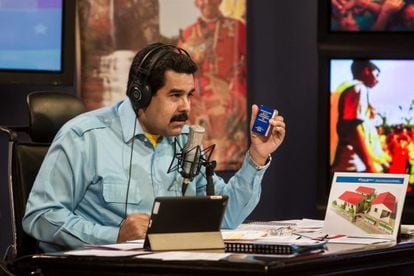Maduro tries to stifle Chavista rebellion
But Venezuelan leader can no longer conceal the rift, as nation questions his leadership

It was no secret that the Chavistas, the followers of the deceased Venezuelan leader Hugo Chávez, were not a monolithic group.
Following the former president’s death in March 2013, the collection of factions that make up Chavismo had held itself together on the basis of their shared goal of clinging on to power.
But since last week, it seems that this motivation is no longer enough.
The eternally serving planning minister, Jorge Giordani, who used to be Chávez’s intellectual mentor, issued a letter following his dismissal on June 17. The letter chided President Nicolás Maduro for failing to convey a sense of leadership, for giving people the feeling that there is a power vacuum in the country, and for making the wrong decisions on economic issues.
The president seems ready to pay the price of an internal party schism
The letter triggered condemnation from the government, and after that, several former Chávez ministers took sides by expressing support for either Giordani or for his critics. Among these was Héctor Navarro, another early member of Chávez’s retinue who was summarily dismissed from the national leadership by Maduro’s United Socialist Party of Venezuela (PSUV).
Rafael Isea, a former finance minister, lamented PSUV’s treatment of former Chávez officials who have expressed criticism of Maduro’s administration. Speaking from his current residence in the United States, he called the goverment's attitude “an extremely serious mistake.”
The critics include several leading figures from the days of Hugo Chávez, giving the impression that Chavismo could be making way for Madurismo, a somewhat more pragmatic and revisionist take on the Bolivarian Revolution that is trying to take the leftist movement down a similar path as that followed by Deng Xiaoping when he opened up Communist China to business and trade.
But now that he can no longer conceal the internal rift, Nicolás Maduro is starting to sound more like Stalin.
“They’re producing letters to destroy the revolution and justify their mistakes!” yelled the president on Wednesday in Maracay, 100 kilometers west of Caracas. Maduro demanded “top loyalty and discipline” in front of representatives of the Hugo Chávez Battle Units, which is PSUV's strike force.
I prefer the counsel of the common people to the advice of phony wise men” Nicolás Maduro
He also lamented that, at a “historically significant” moment, he is being delivered “a stab in the back,” and warned Chavistas that it is time to clearly take sides, either with his government or with “personality-centered projects.”
The tumultuous gathering was dominated by cries requesting a purge. On occasion, it also sounded like a pogrom against the intellectual class. “I prefer the counsel of the common people to the advice of phony wise men,” said Maduro, noting that the critical faction appears to be led by academics.
Minutes earlier, the mayor of Libertador and former deputy prime minister, Jorge Rodríguez, had stated that “studying is necessary, but studying does not provide wisdom.”
Cornered by an unprecedented liquidity crisis, a continued shortage of everyday products and an incipient uprising that official rhetoric has tried to portray as an ongoing coup and an assassination attempt, Maduro is now dealing with an internal rebellion at the worst possible moment. Opinion polls show that his grassroots support is eroding: barely 30 percent of Venezuelans approve of Maduro’s management and recognize his leadership.
But the president seems ready to pay the price of an internal party schism. He prefers to take this risk rather than lose control of his playing field. The PSUV congress scheduled for late July should have smoothly appointed him party president, but the way things are looking, the gathering could well turn into a real competition. So in order to prevent any trouble, pro-government forces are getting ready to eliminate the dissidents — and any remnants of internal democracy — before the congress delegates are officially designated.
“All this is part of an attempt to control the party congress,” admitted Diosdado Cabello, president of the National Assembly and Chavismo’s number-two man. Cabello, a former lieutenant in the army, represents an alternative leader to Maduro, although he has circumstantially teamed up with the president in their common fight against Chavismo’s old guard.










































